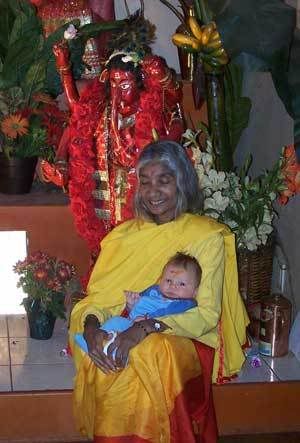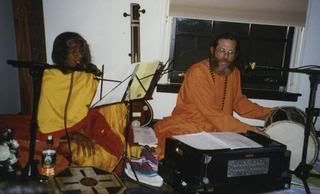Question:
When is Navaratri celebrated ? Could you please let me know if there are six Navaratris and are they Varsha, Sharad, Shishir, Hemant, Vasant, Grishma?
Swamiji says:
Navaratri can be celebrated at any time. Most often it is observed from Pratipad to Navami or from Shashti to Purnima or Amavashya. There are four Navaratris which are special: Magh, Chaitra, Ashadh, and Ashvin. These correspond to winter, spring, summer, and fall.
Question:
Can you please suggest any guidelines for people wishing to observe the Navaratri fast in the same way that you do. (24 hours X 9 days. No water, no food)
Swamiji says:
Start off small and be content with small steps. Observe 24 hours with only water, then drink. Actually you will probably want salt more than water. Then try three days. And eat only fruits and water one time a day for the remainder of the nine days. Slowly you will extend it.
Question:
It is my understanding that no grains, or salty food is to be eaten during Navaratri. It is a symbolic giving up for the goddess. Are fruit and vegetables ok? To fast completely is for a greater tapas, and austerity. Is this correct?
Swamiji says:
The fasting gives forth a number of benefits. We suggest that everyone observe the vow according to their own capacity: the needs of the body, the activities in which the body must engage during the vow, etc. Some will give up grains and pulses, some will only take fruit and dairy, some will only take water: each according to his or her own capacity.
Question:
How do we count Navratri? Sundown to Sundown? Sunrise to Sunrise? Or Sunrise to Sundown?
Swamiji says:
We use a Panchanga, an almanac timed according to the phases of the moon.
Question:
Does one fast for 9 days during Navraatri without food, only water?
Swamiji says:
Some will fast on only water.
Question:
I would like to know is it possible to do homa of 108 names of Durga Ma from the Chandi Path for Navaratri?
Swamiji says:
Yes.
Navaratri at the Mandir
Question:
How do you observe Navaratri at the Mandir?
Swamiji says:
Mahalaya is the new moon before the Navaratri begins. We will perform the Cosmic Puja, complete Shraddha and Tarpana, and complete Chandi. The day after Mahalaya is the first day of Navaratri. Every day we will perform the Cosmic Puja, and complete Chandi. We will break the fast on the 8th night (ashtami).
Question:
What is the system that You and Shree Maa follow for prayers during Navratri?
Swamiji says:
We recite the entire Cosmic Puja and Chandi Path every day.
Question:
When during Navaratri do we worship Durga, when Lakshmi, and when Saraswati? What prayers are done during this period? Can Lalita Stotram also be recited?
Swamiji says:
We perform the entire Cosmic Puja every day. That includes Mahakali, Mahalakshmi, and Mahasarasvati.
Lalita can also be recited, but Chandi Path is not to be neglected.
Devi Mandir’s newest member — Welcome Dev!

Photo of the week – Oct 5 – Oct 11 2007
(Picture taken Sep 2007 at the Devi Mandir)
Check out our new weekly blogs.
Story of Bali and Vishnu
~~OM~~ Do you remember when Bali was doing the Yagya by which he would defeat the Devas eternally? He was the king of the asuras, and he wanted to perform the Yagya by which the asuras would occupy heaven for all eternity, and the Gods would have no place to live. And the God’s were […]
Sing your heart out for God!

Photo of the week – Sep 28 – Oct 4 2007
(Picture taken sometime back during world tour)
Homa
Topics covered in this Question and Answer session with Swamiji:
- Definition of homa
- Auspicious days for homa
- Homa viddhi
- Fire pits
- Fire sacrifice out open or in shade
- Homa in the day or the night
- Homa purnahuti
- Wood and masala for homa
- Using modern appliances for homa
- Blowing into fire
- Fire hazards
Guidance for Leading a Spiritual Life
Topics covered in this Question and Answer session with Swamiji:
- Attributes of spiritual seekers
- Goals and surrender
- Spiritual goal
- Dealing with our faults
- How to speak
- Surrender
- Sincerity
- Charity
- Efficiency in karma
- How not to be exploited
- How to respond when people get physical
- Desire to remain aloof
- How to make friends with God
- When the world comes knocking
- Surrender and correct attitude
- Making more time for God
- Unable to say “No”
- Negative emotions
- Challenges of family
- Fear of death
- Stress and confusion
- Detachment in the middle of suffering
- Choosing an Ishta Devata
- Combining relationship and spiritual life
- Does God love me?
- When our friends fall
- Understanding death
- Stillness
- Serving the world
- Destiny
- Silence
Altar and Puja
Topics covered in this Question and Answer session with Swamiji:
- Mudras
- Murtis
- Purification
- Puja to Saints and Masters
- Puja Experiences
- Prana Pratishtha
- Consumption of Prasad
- Visarjana
- Altar Vastu and Altar Direction
- Yantra
- Disposing of Old Articles of Worship
- Worship Restrictions for Women
- Short Puja to Deity
- Puja for Welfare of Humanity
- Expanding Our Puja
- Order of Worship
- Rearranging Altar
- Duration of Sankalpa
Story of How Parvati Was Born
~~OM~~ When Sati Devi left her body, Shiva became an ascetic. He just spent all His time in meditation. And at that time a great asura named Tarakasura, the illuminator of duality, did tremendous austerities and Brahma came to him and said, “What do you want?” He said, “I want to be immortal.” Brahma said, […]
Story of Three Thieves
~~OM~~
I want to tell you a story, if you don’t mind. There were three robbers, three thieves, who came upon a man in a lonely place in the forest. And the first thief said, “This guy is of no use for us, let’s kill him and take all his stuff.” And the second robber said, “There’s no need to kill him, lets just tie him up, bind him tightly, throw him in a ditch and take all his stuff.”
And that’s what they did. They threw him in the ditch, they tied him all up, they bound him, they stole all his goods and possessions and they made off.
The third thief walked down the path some way, and he started to feel very much remorseful. He started to think, “that poor guy is lying in a ditch all battered and bruised and bound, let me go back and help him.� And that’s what he did, he went to find the victim, and he attended to his wounds, and he unbound him. And he put him on his own horse and led him out of the forest towards his own village.
And the victim said to him, “You have been so kind to me, please come to my village and come to my house, and let me demonstrate my appreciation to you.” And the thief said to him, “I can’t go to your village.” “Why not?” “Well, the police are going to ask me why I was with the robbers in the first place.” And he disappeared. He ran away.
Now the first thief was tama guna. He says, “This guy is of no use for us, let’s just kill him.” The second thief was raja guna. He said, “No need to kill him, just tie him all up, bind him securely, throw him in the samsara, in the ocean of worldliness, where he will have all kinds of miseries.” The third thief was sattva. He says, “No, let me attend to your wounds, let me free you, let me show you the way to go home. But, I can’t go into your village. I can’t go to your house because I too am a thief.”
Sattva only shows the way to go home, he can’t go home with you. Sattva still binds you to the world in activity. To go into the house you have to be nirguna, without any quality. Not trying to do good, not trying to do evil, not trying to do anything. You become nirguna, and then you can go home.
- « Previous Page
- 1
- …
- 146
- 147
- 148
- 149
- 150
- …
- 164
- Next Page »